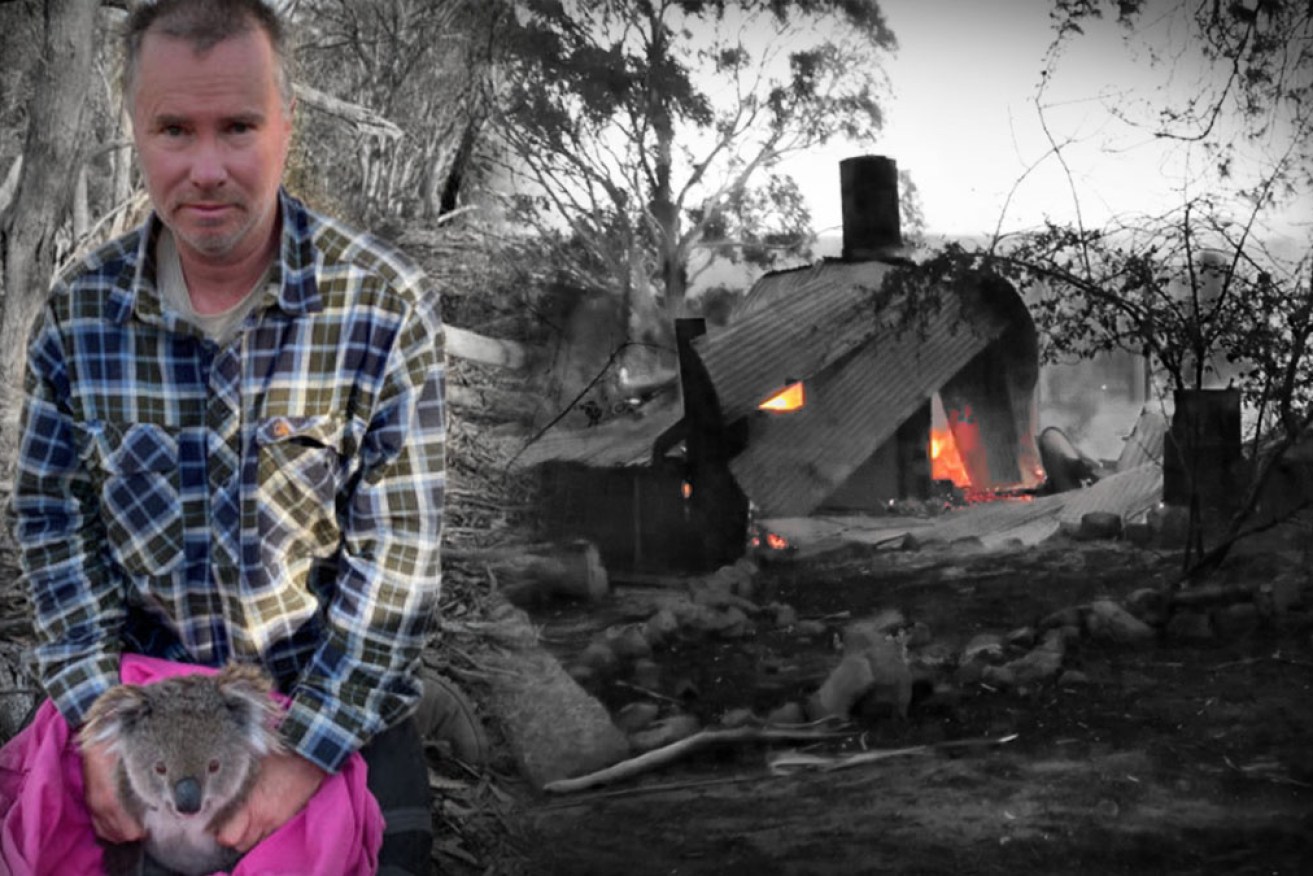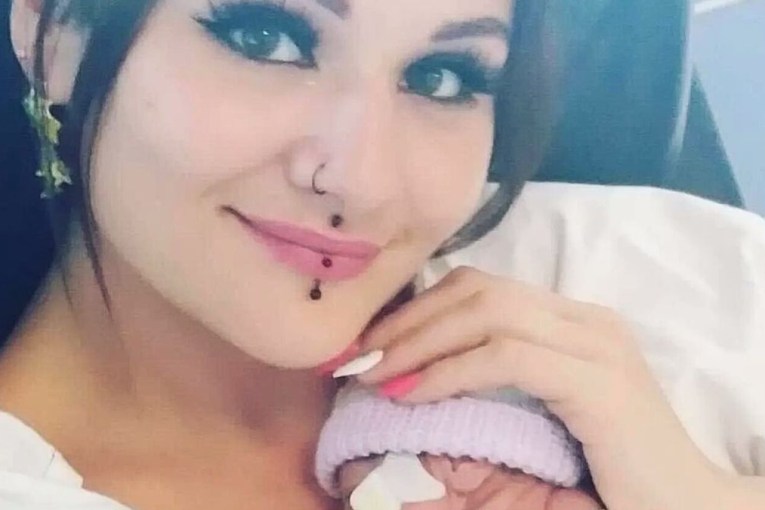Black Summer remembered: How a bushfire tragedy changed this wildlife carer’s life


Three US firefighters died while defending James Fitzgerald's home in the Black Summer bushfires.
James Fitzgerald’s front fence stretches five kilometres and guards an area about 240 times greater than the Bennelong Point site of the iconic Sydney Opera House.
But when the Black Summer bushfires devastated the nation a year ago, the 54-year-old wildlife carer, who volunteers for the New South Wales Rural Fire Service (NSWRFS), was rendered effectively homeless.
When he was done saving wildlife for the day, Mr Fitzgerald would come home to nothing but 1810 acres of dry land and burnt forest.
Most around him had no idea; they’d see Mr Fitzgerald at work, climbing up burnt trees to save injured koalas stranded in scorched areas of the NSW bush. They had seen him responding to calls for help from people who had accidentally hit animals with their cars.
But during the night he would sleep in the bushes, wrapping himself in a fire blanket that was used by the Country Fire Authority to cover a badly burnt kangaroo he had taken to a vet.

James Fitzgerald lost his house in 2020’s Black Summer bushfires.
Saturday marked one year since the retired Australian Taxation Office employee lost everything in a devastating bushfire.
But more than that, it was a day to remember three American aerial firefighters who arrived in Australia to battle the bushfire crisis and died while trying to stop Mr Fitzgerald’s property from being attacked by the flames.
If at night he starts thinking about the tragedy that unfolded on January 23, 2020, Mr Fitzgerald, who now enjoys the relative luxury of a caravan, gets out the DVD player and puts on a video to help him fall asleep.
“Even if I tried to go to sleep normally, I start thinking about the plane crash and all the people that died,” he told The New Daily.
For a long time after, he had not even the basic essentials – no electricity, no working fridge, no running shower, no food and no access to water.

Where Mr Fitzgerald slept before getting access to a caravan.
The day everything changed
Early morning on January 23, 2020, Mr Fitzgerald was in an area of bushland that had been burnt by fire and was trying to locate surviving koalas.
He managed to save one before the wind picked up about 10.30am.
“The roar of the wind was just like nothing I’d ever heard before,” he said.
Mr Fitzgerald was at risk of dead branches falling on him.

‘The roar of the wind was just like nothing I’d ever heard before’, Mr Fitzgerald said. Photo: Getty
To make matters worse, the extremely strong winds had restarted a fire in the area, which was 20 kilometres from his property in the Snowy Mountains of NSW.
But before he could return home, he made it his duty to help others evacuate.
There was a woman he knew who lived across a nearby river, so he drove over there and helped her get her things together.
He then ventured over to another friend’s place to help them get their wombats out before taking the koala he had rescued that morning to a vet.

Two koala enclosures on Mr Fitzgerald’s property. Photo: Facebook
Mr Fitzgerald tried to get hold of his fire captain to see if his local area had been affected, but with no luck. So he turned for home, only to find a police blockade at the start of the road leading to his property.
He had already heard on the radio that a firefighting plane had lost contact with the NSWRFS somewhere in the Snowy Mountains.
“I didn’t think it was my place,” he said.
He explained to the police officer he was with the NSWRFS and that he wanted to evacuate the two koalas and two goannas that were recovering on his property from bushfire-related injures.
Mr Fitzgerald recalled the officer saying he hadn’t heard of any houses burning down or animals being killed. The officer then obtained permission to let him through the roadblock.
That’s when Mr Fitzgerald found everything on his 733-hectare spread, including his home and Two Thumbs Wildlife Trust koala sanctuary, had been destroyed. The animals he had saved had perished too.
He documented his reaction (see the video below).
Mr Fitzgerald later learned the C-130 Hercules air tanker, which had lost contact with the NSWRFS, crashed moments after dropping fire retardant on Mr Fitzgerald’s property.
Captain Ian McBeth, 44, who had been piloting the aircraft, as well as First Officer Paul Hudson, 42, and flight engineer Rick DeMorgan, 43, died at the scene.
“Whenever I think of that, tears start coming,” Mr Fitzgerald said.

An aerial shot of the crash site in southern NSW. Photo: NSW Police
Life in the ashes
Mr Fitzgerald sometimes went three days without any sleep.
Before he managed to get the caravan he now calls home, he had to sleep on the ground in the forest. There were also days when he didn’t drink or eat.
“If you had to take an animal to the vet, you would try and stop at some café restaurant and eat.
“So I generally ate once, if you were lucky. Some days you just weren’t lucky.”

Mr Fitzgerald was homeless before acquiring the caravan.
From time to time, Mr Fitzgerald would drive about 45 minutes to the nearest pub, the Bredbo Inn, to take a shower.
Even when he moved into the caravan he was sleeping in sub-zero temperatures.
He said it took seven months and four days for the electricity company to turn the power on, despite being parked next to a power pole at Peak View in the Snowy Mountains.
Labour of love
Mr Fitzgerald isn’t paid to save wildlife, but that doesn’t stop him from going above and beyond for them, regardless of the dire situation he is in.
He recalled getting a call from a couple who had come across an injured goanna on the side of the road.

Mr Fitzgerald is still in the process of rebuilding a new home one year on from the fire that ravaged his property.
Without a second thought, Mr Fitzgerald dropped everything and drove for about nine hours to get to the NSW town of Deniliquin to pick up the goanna, which had been run over by a car.
The couple who phoned Mr Fitzgerald had come across the injured reptile but were unable to find a local vet with wildlife experience who could treat it.
“If we have an animal and the best vet is in Sydney, we drive to Sydney … different vets know different species.”

Mr Fitzgerald is passionate about rescuing and caring for wildlife.
Because Mr Fitzgerald’s goanna enclosures were destroyed in the fire, he gave the goanna, which he’d gone above and beyond for, to another wildlife carer to look after.
“That’s two days gone that you didn’t know was going to go. And you’re still living in your caravan trying to rebuild.”
Mr Fitzgerald is surrounded by a burnt forest.

What Mr Fitzgerald sees when he looks outside his caravan.
But despite losing everything, he hasn’t lost an ounce of his commitment to rescuing and rehabilitating injured wildlife.
“What would you do if you see a burnt koala?” he asked. “You got to help it. And so once you’ve seen one, don’t you go and look for the others?”
He gave the names Ian, Rick and Paul to the koala he saved on the morning of January 23, as well as the first two koalas he rescued following the tragedy – three living tributes to the American firebombers whose lives were consumed by the flames.








